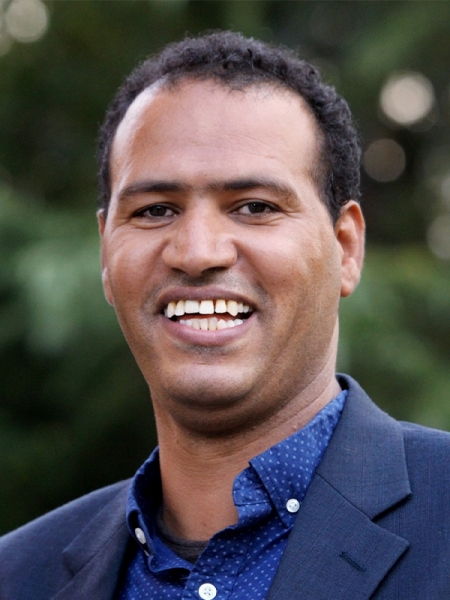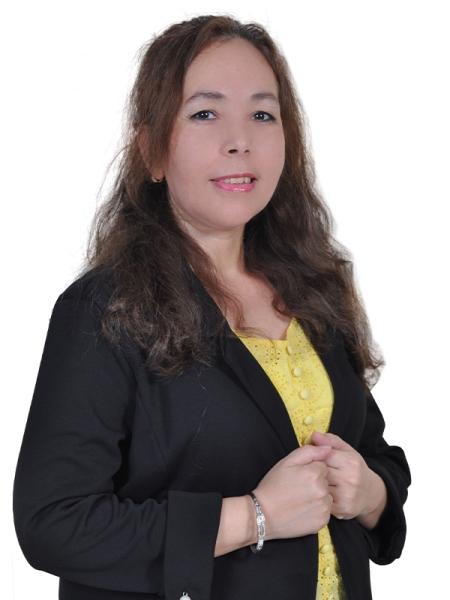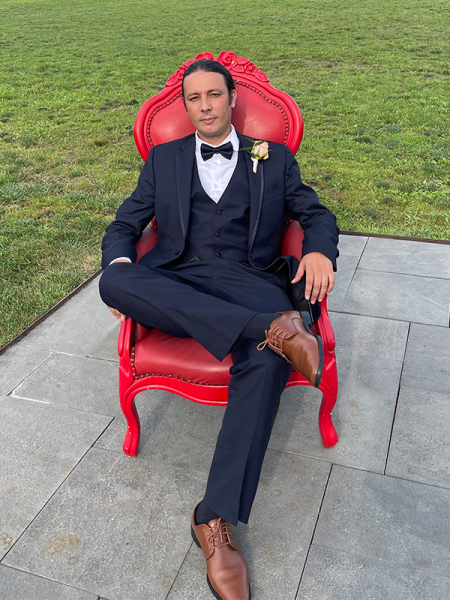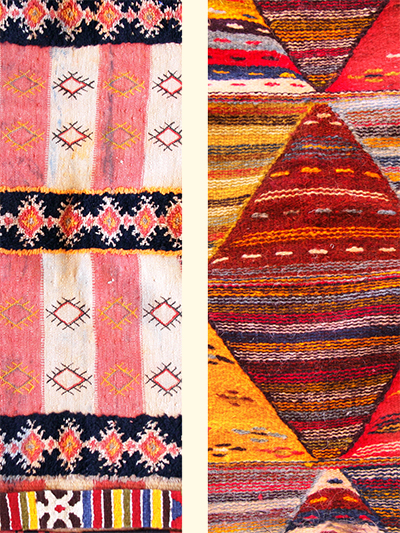This panel combines poetic readings in both Tamazight and English with a scholarly intervention on the construction of Amazigh literature. The participants will discuss the imbrication of Indigeneity and literary concerns in Amazigh people's struggle for recognition of their language and culture in their indigenous homeland in Tamazgha (the broader North Africa).
 A Black and Amazigh Indigenous scholar from Morocco, Brahim El Guabli is an Associate Professor of Arabic Studies and Comparative Literature at Williams College. His first book is entitled Moroccan Other-Archives: History and Citizenship after State Violence (Fordham University Press, 2023). He’s currently completing a second book entitled Desert Imaginations: Saharanism and its Discontents. His journal articles have appeared in LA Review of Books, PMLA, Interventions, The Cambridge Journal of Postcolonial Literary Inquiry, Arab Studies Journal, History in Africa, META, and the Journal of North African Studies, among others. He is co-editor of the two volumes of Lamalif: A Critical Anthology of Societal Debates in Morocco During the “Years of Lead” (1966-1988) (Liverpool University Press, 2022) and Refiguring Loss: Jews in Maghrebi and Middle Eastern Cultural Production (Pennsylvania State University Press, forthcoming). El Guabli is co-founder and co-editor of Tamazgha Studies Journal, a peer-reviewed journal that seeks to place the Tamazgha at the heart of academic conversations.
A Black and Amazigh Indigenous scholar from Morocco, Brahim El Guabli is an Associate Professor of Arabic Studies and Comparative Literature at Williams College. His first book is entitled Moroccan Other-Archives: History and Citizenship after State Violence (Fordham University Press, 2023). He’s currently completing a second book entitled Desert Imaginations: Saharanism and its Discontents. His journal articles have appeared in LA Review of Books, PMLA, Interventions, The Cambridge Journal of Postcolonial Literary Inquiry, Arab Studies Journal, History in Africa, META, and the Journal of North African Studies, among others. He is co-editor of the two volumes of Lamalif: A Critical Anthology of Societal Debates in Morocco During the “Years of Lead” (1966-1988) (Liverpool University Press, 2022) and Refiguring Loss: Jews in Maghrebi and Middle Eastern Cultural Production (Pennsylvania State University Press, forthcoming). El Guabli is co-founder and co-editor of Tamazgha Studies Journal, a peer-reviewed journal that seeks to place the Tamazgha at the heart of academic conversations.
 Khadija Ikan is a Moroccan writer with works in Arabic and Amazigh. She is a founding member of the league of women writers of morocco, and was responsible for the Amazigh literary file in the league's office (2012–2018). Ikan has won several awards for her literature, including the 1996 ISESCO Award for Short Story in the Islamic World for "When the Carmina Burana Flows," the Appreciation Award from the Royal Institute of Amazigh Culture in 2010, and, the Sudanese Altayeb Salih Prize for Written Creativity in 201I for her short stories "Bosnian Days."
Khadija Ikan is a Moroccan writer with works in Arabic and Amazigh. She is a founding member of the league of women writers of morocco, and was responsible for the Amazigh literary file in the league's office (2012–2018). Ikan has won several awards for her literature, including the 1996 ISESCO Award for Short Story in the Islamic World for "When the Carmina Burana Flows," the Appreciation Award from the Royal Institute of Amazigh Culture in 2010, and, the Sudanese Altayeb Salih Prize for Written Creativity in 201I for her short stories "Bosnian Days."
 Atlas Phoenix possesses a diverse array of expertise and talents. He serves as an adjunct professor of Arabic at the City University of New York (CUNY), where he instructs students in the Arabic language. Additionally, he functions as an English as a Second Language (ESL) instructor, providing language acquisition guidance to individuals with varying linguistic backgrounds. Furthermore, Phoenix operates as a freelance translator, facilitating communication between Amazigh/Arabic and English languages. Beyond his linguistic pursuits, he is a skilled musician specializing in Gnawa music, a traditional genre from North Africa. Moreover, Phoenix showcases his artistic prowess as an Amazigh poet, crafting poignant verse that reflects his cultural heritage. His multifaceted engagements exemplify a commitment to scholarship, language proficiency, and artistic expression.
Atlas Phoenix possesses a diverse array of expertise and talents. He serves as an adjunct professor of Arabic at the City University of New York (CUNY), where he instructs students in the Arabic language. Additionally, he functions as an English as a Second Language (ESL) instructor, providing language acquisition guidance to individuals with varying linguistic backgrounds. Furthermore, Phoenix operates as a freelance translator, facilitating communication between Amazigh/Arabic and English languages. Beyond his linguistic pursuits, he is a skilled musician specializing in Gnawa music, a traditional genre from North Africa. Moreover, Phoenix showcases his artistic prowess as an Amazigh poet, crafting poignant verse that reflects his cultural heritage. His multifaceted engagements exemplify a commitment to scholarship, language proficiency, and artistic expression.



